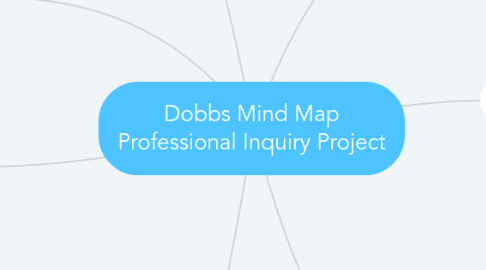Dobbs Mind Map Professional Inquiry Project
저자: Michael Dobbs

1. Special Education
1.1. How can I, as an Ed Tech, advocate better for the students I am assisting in classrooms outside of special ed rooms.
1.2. How do we reach the students that do not want help from an Ed Tech but still need it?
1.3. When I am not available to be there for a student that requires Ed Tech support what can I do to assist them? (Technology-based or in-person help)
1.4. How can we increase the inclusion of special education students in regular settings? (i.e. sports, bestBuddies/Unified sports - Why do we not have these programs?
1.5. Why can Ed Techs not be issued a computer that prints? I type so many notes for my students that I am not able to print for them? What other options do we have to?
1.6. How can we increase parent participation at IEP meetings?
2. Habits of Mind/Habits of Work
2.1. What benefits would we observe if we implemented a habits of mind/habits of work?
2.2. How would we effectively communicate the importance of a habits of work if it does not become part of a transcript?
3. School Tech Needs
3.1. Besides money constraints are there reasons why our school is still using outdated technology?
3.2. Why are there not more technology-based courses?
3.3. How can we take advantage of technology to better prepare students for the future?
3.4. How can we leverage technology?
4. Student Needs
4.1. With everything, we know about the benefits of exercise on a growing child’s mind. Why do we not have P.E. every day for at least an hour? (All 4 years of High School)
4.2. What can I do to better empower my students?
4.3. What courses do our students really need to be successful after they leave our classrooms?
4.4. What skills do our students need to be taught if they are not planning on attending college after High School
4.5. Why are we teaching every student as if he or she is going to college after High School? (Not every student does.)
4.6. How can I connect students to subject matter experts in the fields that they may want to eventually become a part of after graduation?
4.7. How can I engage better with my students?
5. Assessment
5.1. Why do we have two grading systems
5.2. Why are student-athletes allowed to fail a class and still be eligible to play?
5.3. How can a student pass a class but still fail graduation standards?
5.4. How can a student fail a class but still pass graduation standards?
5.5. How do we convey the importance of Social Emotional Learning if we don’t “grade”, report out, or communicate a students’ work in this area?
6. Student Questions
6.1. Why are classes 80 mins long?
6.2. Why are there not more options at lunch? (Healthier?)
7. PD
7.1. How do I help other teachers learn about all the technology resources available to them?
7.2. How can I better use the experience and skills I learned from the military to become a better educator?
7.3. How can I use inquiry outside of the classroom to better help the entire community?
7.4. How can we get the community more involved in the education of our students?
7.5. How do we reduce the number of social media-related issues that are brought into the school from the outside?


